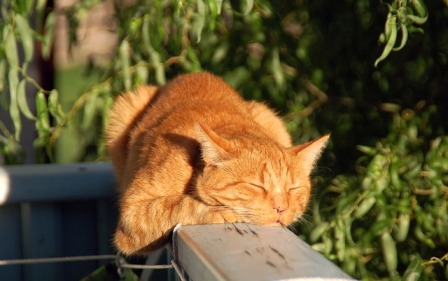Why Do Cats like Warmth?
Why Do Cats like Warmth?
How many times have we seen our cat stretching in the warm places in our home, especially when it is raining outside, or lying on a window sill on sunny days, until it accumulates all the heat. We can find ourselves wondering how it can endure such warmth or how it avoids overheating. To find answers to those questions, we have to remind ourselves of their genetic origin. As we know, ancestors of today’s domestic cats lived in the deserts of the Middle East, where they adopted their bodies on extremely hot temperature and exceptionally dry air. Their long body and short hair were designed to endure this scorching climate. Apart from that, many other reasons also affect cat’s affection for warmth. The article “Cats: Creatures of Comfort. . . And Warmth” describes five facts that explain why cats like warmth.
Why Do Cats like Warmth?
Five facts your cat wants you to know about temperature and her comfort:
1. Cats seek warmth – You may often see your cat following the sunshine along the floor, or stretching out in enjoyment in front of the heat registers. Cats
like height, and often may be found on the top shelf of a bookcase, the top of the refrigerator, or on a fireplace mantel, napping. She knows these
places are often the warmest places in the house, as well.2. A cat’s ability to control heat varies with age – Because newborn kittens do not generate enough of their own heat, they must rely on their mother. From
the time they are born, kittens have a keen sense of temperature from receptors on their faces. This helps them find their mother before their eyes have
opened.
As cats grow into adulthood, they still seek heat. Compared to people, cats have fewer heat receptors on their bodies. Humans feel pain when their skin
temperature reaches 112°F, whereas cats may not show pain until the temperature of their skin reaches 126°F. Cats can stay in longer contact with
something hot enough to burn them without experiencing pain compared to a human. This is why cats can burn themselves, for example, walking across a hot
stove.3. Breed makes a difference – Some breeds are known to be more cold tolerant than others. For instance, Maine Coon Cats, with their thick coats, can be
comfortable on an unheated screen porch in the fall, or even on a mild winter day.4. Seasonal changes may affect your cat – When warm spring weather and longer days arrive, many cats will be more active and playful. There are birds and
chipmunks to watch through the window, more smells to investigate, and the increase in human activity may provide more interesting things to watch and
explore.5. Illness may cause a change in your cat’s heat-seeking behavior – Hyperthyroid cats may be less likely to seek out warm places to sleep. Other illnesses
may cause a cat to seek out warmer places than normal. If your cat’s behavior changes, please contact your veterinarian.
Even though cats develop high resistance to extremely high temperature and have fewer heat receptors than humans, they can also search for heat when they reach an older age. For many aging cats, warmth can have a huge beneficial effect on their health, especially when the cat is in pain or has arthritis. Not only warmth proved to be a mitigating factor for these health issues, but also has been shown as a condition that optimizes the drop in basal metabolism. In this way, the cat’s body can be on standby and does not need to generate too much energy while sleeping.










